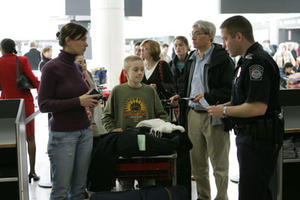Border securityCBP overtime costs soar, agency seeks solutions
Over the past six years U.S. Border Patrol agents have accrued more and more overtime pay at the same time that the number of arrests for illegal crossers has fallen to record lows; the cost of overtime has rocketed from roughly $156 million in 2006 to more than $331 million in 2011, with DHS spending more than $1.4 billion total during that time period

CBP checking documents // Source: cbp.gov
Over the past six years U.S. Border Patrol agents have accruedmore and more overtime pay at the same time that the number of arrests for illegal crossers has fallen to record lows.
The cost of overtime has rocketed from roughly $156 million in 2006 to more than $331 million in 2011, with DHS spending more than $1.4 billion total during that time period. Meanwhile the increase in overtime coincided with the addition of 9,000 U.S. Customs and Border Protection (CBP) agents as well as the number of border apprehensions dropping to roughly 340,000, a nearly forty-year low.
The latest overtime pay numbers come as lawmakers and departments across the federal government are seeking ways to cut costs. More specifically CBP officials are considering new overtime regulations that would save the agency money.
Border Patrol Deputy Chief Ronald D. Vitiello said the agency is exploring several options to reduce the cost of overtime including moving to ten hour shifts for four days a week.
Meanwhile Sharon Snellings, CBP’s deputy assistant commissioner of human resources, said the agency is looking into using a different overtime system that other law enforcement agencies use. According to Snellings, the shift could reduce overtime costs by approximately $70 million a year.
Under current CBP overtime regulations, agents earn 10 to 25 percent extra pay per hour for the first two hours of overtime. The pay rate steadily decreases each hour past those two initial hours. In a year agents can earn an estimated $15,000 beyond their base salary, which is on average $60,000 a year for more experienced agents. Annual overtime is capped at $35,000.
Vitiello explained that the daily duties of patrolling the border are unpredictable and often require longer hours for agents.
“The uncontrollable nature of the work is inherent in the primary duty of a Border Patrol agent and must be performed in order to get the job done,” Vitiello said.
Vitello added that agents must often work beyond their scheduled shift to make arrests or talk to key witnesses and most overtime hours occur when CBP agents drive from remote locations to their home base or when they have to stay late to finish paperwork from an arrest or the seizure of illegal cargo.
All of the overtime hours, he said, are absolutely necessary in ensuring safety and security along the border.
“Regardless of the level of illegal cross border activity, agents are responsible for securing the border against all threats,” Vitiello said. “This means that agents must have the flexibility to develop intelligence, act on that intelligence, interact with the community and work with their law enforcement counterparts on illegal activity that has a nexus to the mission.”
